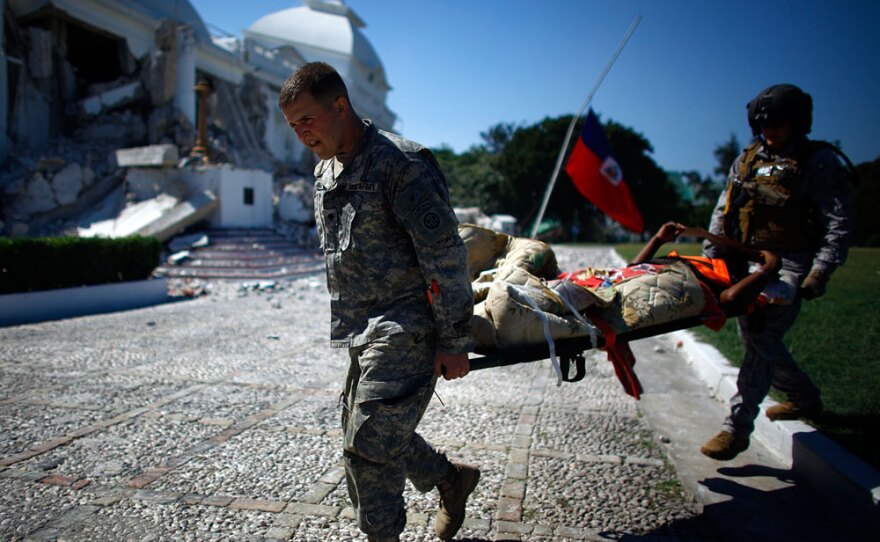The U.S. military, stretched thin in Iraq and Afghanistan, has taken on another major operation after a massive earthquake hit Haiti. About 22,000 service members responded, many of them distributing food and providing medical aid.
Now, American troops are preparing for another phase as Haiti tries to recover, and that has raised questions about how long they will be staying.
On a recent morning, Army paratroopers who had been training for combat in Afghanistan instead moved in a convoy bound for Cite Soleil, a huge and notoriously violent slum in Port-au-Prince, Haiti's capital.
Hungry people fill the neighborhood, where on this day 40 soldiers from Alpha Company provided security as sacks of American-grown, long-grain rice — in bags stamped with the Stars and Stripes — were handed out to Haitian women.
Capt. Andrew Salmo, who oversaw the operation, said that many of the combat veterans are happy to be in Haiti because they are not in as much danger.
"We were ready to deploy, and we were looking forward to a combat deployment. But this has been rewarding in a lot of ways," Salmo said.
The shift to Haiti means that instead of treating wounded soldiers, medic Antonio Rivera, on food distribution efforts like the one to Cite Soleil, helps Haitians balance the heavy bags. One after another, the women thanked the tall, strapping soldier, who said doing the work "feels great."
Washington quickly deployed U.S. forces after the Jan. 12 quake: Doctors aboard a military hospital ship operated on mangled people; air-traffic controllers got the airport up and running.
The global response, though, is at a new stage, focusing on housing and sanitation.
For the troops, it means handing out tarps, poles and ground coverings to get people ready for the rainy season, and helping with a U.N. effort to build latrines.
These efforts are "absolutely critical for the next stages," Lewis Lucke, the U.S. coordinator for relief and reconstruction, said to reporters at a recent news conference.
Lucke said American forces have scaled down, to 7,000 soldiers on the ground and another 6,000 troops on ships just offshore.
Lt. Col. Ken Keen, commander of U.S. forces in Haiti, said there are no plans to leave soon.
"At the present time, there's still great need across the board, and we still remain decisively engaged, providing critical assistance to the government of Haiti," Keen said at a news conference.
American military involvement in Haiti in decades past has not been free of controversy. U.S. Marines occupied Haiti for 19 years until 1934. And American forces intervened in 1994 to reinstall President Jean-Bertrand Aristide after his ouster.
Larry Birns, an analyst who follows Haiti closely and is director of the Council on Hemispheric Affairs, says the Obama administration needs to be mindful of that history.
"There's a lot of angst on the part of Haitian intellectuals over this. They hate the idea of having the United States periodically come in. It's patronizing to Haitian history," Birns said, and it's a "condescending attitude that after all, Haiti, unlike other countries, you can expect much less from."
Among those intellectuals is Jean Philippe Mirvil, who was rescued by American troops — pulled from the rubble after he was trapped for six days.
Haitians welcome the American help, but once their work is done, Mirvil says, they will have to leave, and Haitians will have to run their own country.
The U.S. Army has established a command center on the grounds of a university, on the edge of Port-au-Prince. There, soldiers monitor live video of food distribution sites across the capital.
Col. Chris Gibson says the video is shot from unmanned Predator aircraft, permitting the U.S. to respond quickly if security is needed. A huge air-conditioned tent — one of many dotting a field — houses the elaborate setup.
But Gibson says it can all be dismantled in an instant, if Washington deems the mission complete.
"We're all consistent with the theme that we're here to help the Haitian people in their moment of dire need," Gibson said. "And when that time passes, we have no intention of staying in Haiti."





